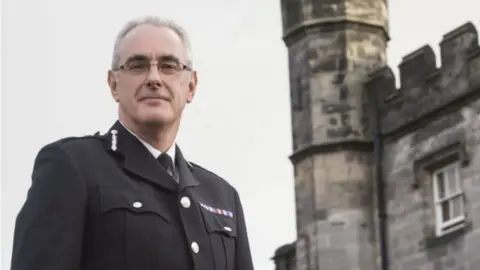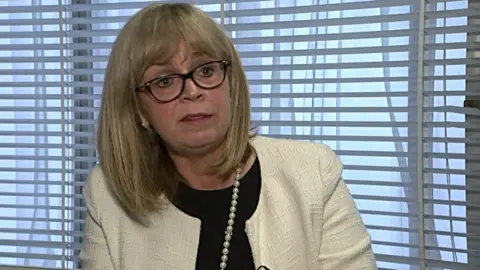Scottish police complaints system 'should be speeded up'
 PA
PAThe former Lord Advocate, Dame Elish Angiolini, has called for changes in the way complaints against senior police officers are handled.
It follows criticism of the process during an investigation into allegations against the former chief constable, Phil Gormley.
Dame Elish said complaints against senior officers in Scotland should be dealt with more speedily.
She has also called for wider use of body cameras by on-duty officers.
Phil Gormley resigned early last year, more than six months after the first in a series of complaints about alleged gross misconduct was made against him.
He was granted special leave as he prepared to fight the allegations made against him, which he strenuously denied.
At the same time, an assistant chief constable who was the subject of a separate complaint was suspended from duty.
In an interim report, Dame Elish makes 30 recommendations in relation to the Police Investigations and Review Commissioner (Pirc), Police Scotland and the Scottish Police Authority (SPA).
 Getty Images
Getty ImagesShe says because of the destabilising impact a prolonged investigation can have, complaints against senior officers should be dealt with more speedily.
Other recommendations include:
- Police Scotland to consider employing more non‑police officer support staff with appropriate seniority, skills and knowledge of complaints handling
- Officers to be made aware that they are the subject of a complaint against them at the earliest practicable point
- The Pirc should adopt a similar policy to England and Wales by recruiting non‑police officers to the most senior posts
- An acceleration of the use of body-worn cameras to help in investigating complaints against officers
- The Pirc to consider creating some regional presence to enhance its capacity to respond immediately to the most serious incidents
Justice Secretary Humza Yousaf said the review was "bringing independent scrutiny to the framework and processes for handling complaints against the police".
He said: "It is essential that the processes in place are fair, transparent, and accountable, respecting the rights of all involved - systems that police officers, staff and the public can have confidence in.
"It will be important to take the time to carefully consider the recommendations and liaise with the organisations involved.
"However, if there are any specific measures which are agreed and can be implemented before the final report is complete, then we will seek to do that."
